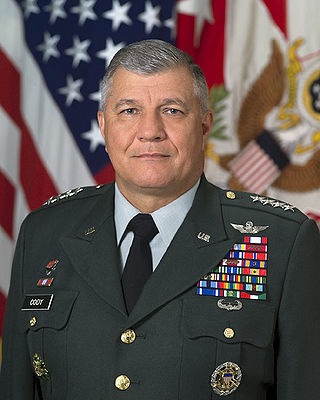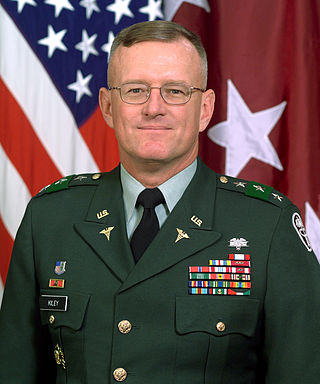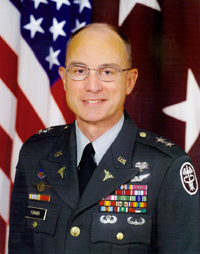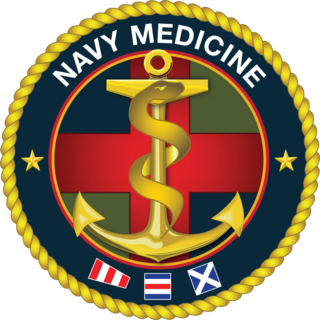
Peter Jan Schoomaker is a retired four-star general of the United States Army who served as the 35th Chief of Staff of the United States Army from June 2003 to April 2007. Schoomaker's appointment as Chief of Staff was unusual in that he was recalled and came out from retirement to assume the position. Schoomaker voluntarily retired from the Army for the second time in 2007 after completing the full four-year term as Chief of Staff.

The U.S. Army Medical Command (MEDCOM) is a direct reporting unit of the U.S. Army that formerly provided command and control of the Army's fixed-facility medical, dental, and veterinary treatment facilities, providing preventive care, medical research and development and training institutions. On 1 October 2019, operational and administrative control of all military medical facilities transitioned to the Defense Health Agency.

The Walter Reed Army Medical Center (WRAMC), officially known as Walter Reed General Hospital (WRGH) until 1951, was the U.S. Army's flagship medical center from 1909 to 2011. Located on 113 acres (46 ha) in Washington, D.C., it served more than 150,000 active and retired personnel from all branches of the United States Armed Forces. The center was named after Walter Reed, a U.S. Army physician and Major who led the team that confirmed that yellow fever is transmitted by mosquitoes rather than direct physical contact.

Richard Arthur "Dick" Cody is a retired United States Army general who served as the 31st Vice Chief of Staff of the United States Army from 24 June 2004 to 31 July 2008. He retired from the Army on 1 August 2008.

The Walter Reed Army Institute of Research (WRAIR) is the largest biomedical research facility administered by the U.S. Department of Defense (DoD). The institute is centered at the Forest Glen Annex, in the Forest Glen Park part of the unincorporated Silver Spring urban area in Maryland just north of Washington, DC, but it is a subordinate unit of the U.S. Army Medical Research and Development Command (USAMRDC), headquartered at nearby Fort Detrick, Maryland. At Forest Glen, the WRAIR has shared a laboratory and administrative facility — the Sen Daniel K. Inouye Building, also known as Building 503 — with the Naval Medical Research Center since 1999.

Major General George William Weightman was a U.S. Army Family Medicine physician who was commander of the North Atlantic Regional Medical Command and Walter Reed Army Medical Center (WRAMC). He was relieved of his WRAMC command on March 1, 2007, in the wake of the Walter Reed Army Medical Center neglect scandal. He took command of the U.S. Army Medical Research and Materiel Command in November 2007 and retired from active duty on 31 March 2009.

Kevin Christopher Kiley is a former lieutenant general in the United States Army who served as the 41st Surgeon General of the United States Army and the commander of the U.S. Army Medical Command, Fort Sam Houston, Texas. He was commander of Walter Reed Army Medical Center and North Atlantic Regional Medical Command twice, from 2002 to 2004, and as acting commander, March 1–2, 2007. He submitted his request to retire from the U.S. Army on March 11, 2007, in the wake of the Walter Reed Army Medical Center neglect scandal, and was removed from his nominative billet as a lieutenant general. Pending retirement, he was assigned to a temporary billet at the General Officer Management Office at the Pentagon in the grade major general. His retirement in the grade of major general was subsequently approved.

Major General Kenneth Lloyd Farmer Jr. commanded Walter Reed Army Medical Center and North Atlantic Regional Medical Command from June 2004 to August 2006.

Gale S. Pollock is a retired United States Army major general who served as the Deputy Surgeon General of the United States Army from October 2006 to March 2007, and also as chief of the Army Nurse Corps. She became acting Surgeon General of the United States Army for nine months following the 20 March 2007 retirement of her predecessor, Kevin C. Kiley, due to fallout from the Walter Reed Army Medical Center neglect scandal. She was the first woman and the first non-physician to hold the position.

The term military medicine has a number of potential connotations. It may mean:

Lt. Gen. (Ret.) Ronald Ray Blanck, D.O. was the 39th Surgeon General of the United States Army, from 1996 to 2000. He is a Doctor of Osteopathic Medicine (D.O.) and is the only such physician ever appointed Surgeon General of the Army. He was also president of the University of North Texas Health Science Center at Fort Worth from 2000 to 2006. He is the former chairman of the board of regents of the Uniformed Services University of the Health Sciences.

The Bureau of Medicine and Surgery (BUMED) is an agency of the United States Department of the Navy that manages health care activities for the United States Navy and the United States Marine Corps. BUMED operates hospitals and other healthcare facilities as well as laboratories for biomedical research, and trains and manages the Navy's many staff corps related to medicine. Its headquarters is located at the Defense Health Headquarters in Fairfax County, Virginia. BUMED has 41,930 medical personnel and more than a million eligible beneficiaries.

James K. Gilman, a retired United States Army Major General and physician from Hymera, Indiana, became the first chief executive officer of the NIH Clinical Center Jan. 9, 2017. The NIH Clinical Center is the nation's largest hospital devoted to clinical research.
The United States Army Medical Unit (1956–1969) – a now defunct medical research unit for biodefense – was at Fort Detrick, Maryland, US. In contrast to the U.S. Army Biological Warfare Laboratories (1943–1969), also at Fort Detrick, the USAMU's mission was purely to develop defensive measures against bio-agents, as opposed to weapons development. The USAMU was the predecessor to today's USAMRIID.

Joseph Caravalho Jr. is an American physician and retired Major General of the Medical Corps of the United States Army. He is currently the president and CEO of the Henry M. Jackson Foundation for the Advancement of Military Medicine. He has held specialized staff medical positions, served in operations at hospitals, and commanded major medical installations across the United States as well as operations in actions overseas. In December 2015, he was appointed as the Joint Staff surgeon, the chief medical advisor to the Chairman of the Joint Chiefs of Staff.

Ming T. "Ted" Wong is a retired major general and dentist in the United States Army. He was Chief of the US Army Dental Corps from 2010 until his retirement in 2014 and variously served as Commander for the Western Regional Medical Command, the North Atlantic Regional Dental Command, the Southern Regional Medical Command, William Beaumont Army Medical Center, the Northern Regional Medical Command, and the Brooke Army Medical Center, among others.
The National Interagency Confederation for Biological Research is a biotechnology and biodefense partnership and collaborative environment of eight U.S. Federal government agencies through the National Interagency Biodefense Campus (NIBC) at Fort Detrick, Maryland, US. NICBR was created in the wake of the September 11 attacks and the 2001 anthrax attacks as a way to bring a whole-of-government approach to addressing bioterrorism threats. Before this, countering biological weapons fell to the Department of Defense (DoD) and focused on protection of troops in the field.

Shan K. Bagby is a United States Army brigadier general and the 28th Chief of the Army Dental Corps. Bagby also serves as the Commanding General, Regional Health Command-Central. Bagby, an oral and maxillofacial surgeon, was the Army’s first African-American dental officer promoted to brigadier general.

Deydre S. Teyhen is a U.S. Army brigadier general and the 20th Chief of the Army Medical Specialist Corps. Teyhen also serves as Commanding General, Brooke Army Medical Center (BAMC), and the Deputy Market Director, San Antonio Market, Defense Health Agency. Teyhen, a physical therapist, is the Army's first active duty Medical Specialist Corps officer and physical therapist promoted to brigadier general.

Elder Granger is a retired major general of the United States Army who served as a deputy director and program executive officer of TRICARE Management Activity.




















